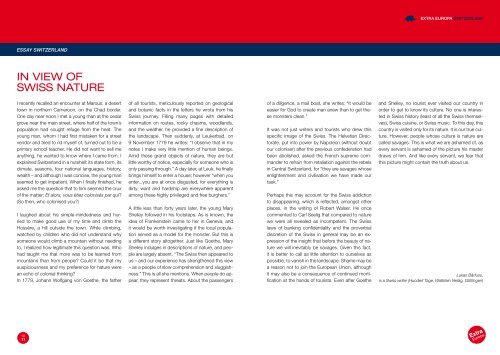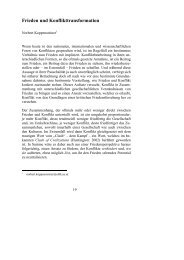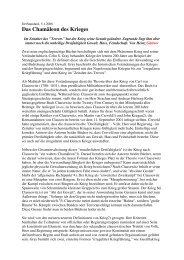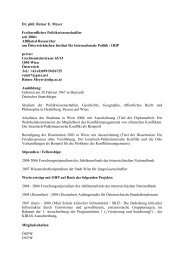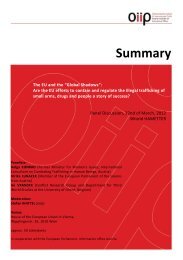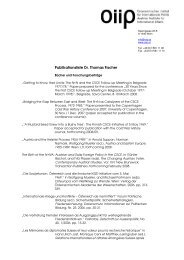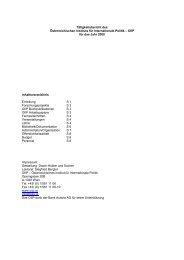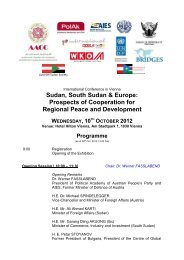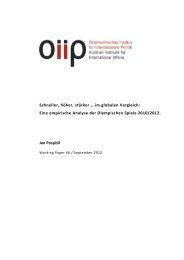Untitled - Oiip
Untitled - Oiip
Untitled - Oiip
Create successful ePaper yourself
Turn your PDF publications into a flip-book with our unique Google optimized e-Paper software.
EXTRA EUROPA SWITZERLAND<br />
ESSAY SWITZERLAND<br />
IN VIEW OF<br />
SWISS NATURE<br />
I recently recalled an encounter at Marous, a desert<br />
town in northern Cameroon, on the Chad border.<br />
One day near noon I met a young man at the cedar<br />
grove near the main street, where half of the town’s<br />
population had sought refuge from the heat. The<br />
young man, whom I had first mistaken for a street<br />
vendor and tried to rid myself of, turned out to be a<br />
primary school teacher. He did not want to sell me<br />
anything, he wanted to know where I came from. I<br />
explained Switzerland in a nutshell: its state form, its<br />
climate, seasons, four national languages, history,<br />
wealth – and although I was concise, the young man<br />
seemed to get impatient. When I finally finished, he<br />
asked me the question that to him seemed the crux<br />
of the matter: Et alors, vous étiez colonisés par qui?<br />
(So then, who colonised you?)<br />
I laughed about his simple-mindedness and hurried<br />
to make good use of my time and climb the<br />
Hossère, a hill outside the town. While climbing,<br />
watched by children who did not understand why<br />
someone would climb a mountain without needing<br />
to, I realized how legitimate this question was. Who<br />
had taught me that more was to be learned from<br />
mountains than from people? Could it be that my<br />
suspiciousness and my preference for nature were<br />
an echo of colonial thinking?<br />
In 1779, Johann Wolfgang von Goethe, the father<br />
of all tourists, meticulously reported on geological<br />
and botanic facts in the letters he wrote from his<br />
Swiss journey. Filling many pages with detailed<br />
information on routes, rocky chasms, woodlands,<br />
and the weather, he provided a fine description of<br />
the landscape. Then suddenly, at Leukerbad, on<br />
9 November 1779 he writes: “I observe that in my<br />
notes I make very little mention of human beings.<br />
Amid these grand objects of nature, they are but<br />
little worthy of notice, especially for someone who is<br />
only passing through.” A day later, at Leuk, he finally<br />
brings himself to enter a house; however “when you<br />
enter...you are at once disgusted, for everything is<br />
dirty; want and hardship are everywhere apparent<br />
among these highly privileged and free burghers.”<br />
A little less than forty years later, the young Mary<br />
Shelley followed in his footsteps. As is known, the<br />
idea of Frankenstein came to her in Geneva, and<br />
it would be worth investigating if the local population<br />
served as a model for the monster. But this is<br />
a different story altogether. Just like Goethe, Mary<br />
Shelley indulges in descriptions of nature, and people<br />
are largely absent. “The Swiss then appeared to<br />
us – and our experience has strengthened this view<br />
– as a people of slow comprehension and sluggishness.”<br />
This is all she mentions. When people do appear,<br />
they represent threats. About the passengers<br />
of a diligence, a mail boat, she writes: “It would be<br />
easier for God to create man anew than to get these<br />
monsters clean.”<br />
It was not just writers and tourists who drew this<br />
specific image of the Swiss. The Helvetian Directorate,<br />
put into power by Napoleon (without doubt<br />
our coloniser) after the previous confederation had<br />
been abolished, asked the French supreme commander<br />
to refrain from retaliation against the rebels<br />
in Central Switzerland, for “they are savages whose<br />
enlightenment and civilisation we have made our<br />
task.”<br />
Perhaps this may account for the Swiss addiction<br />
to disappearing, which is reflected, amongst other<br />
places, in the writing of Robert Walser. He once<br />
commented to Carl Seelig that compared to nature<br />
we were all revealed as incompetent. The Swiss<br />
laws of banking confidentiality and the proverbial<br />
discretion of the Swiss in general may be an expression<br />
of the insight that before the beauty of nature<br />
we will inevitably be savages. Given this fact,<br />
it is better to call as little attention to ourselves as<br />
possible, to vanish in the landscape. Shame may be<br />
a reason not to join the European Union, although<br />
it may also be a consequence of continued mortification<br />
at the hands of tourists. Even after Goethe<br />
and Shelley, no tourist ever visited our country in<br />
order to get to know its culture. No one is interested<br />
in Swiss history (least of all the Swiss themselves),<br />
Swiss cuisine, or Swiss music. To this day, this<br />
country is visited only for its nature. It is our true culture.<br />
However, people whose culture is nature are<br />
called savages. This is what we are ashamed of, as<br />
every servant is ashamed of the picture his master<br />
draws of him. And like every servant, we fear that<br />
this picture might contain the truth about us.<br />
Lukas Bärfuss,<br />
is a Swiss writer (Hundert Tage, Wallstein Verlag, Göttingen)<br />
10<br />
11


